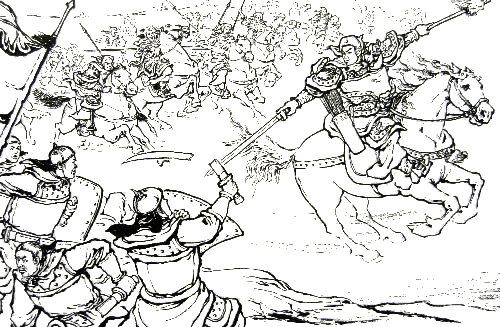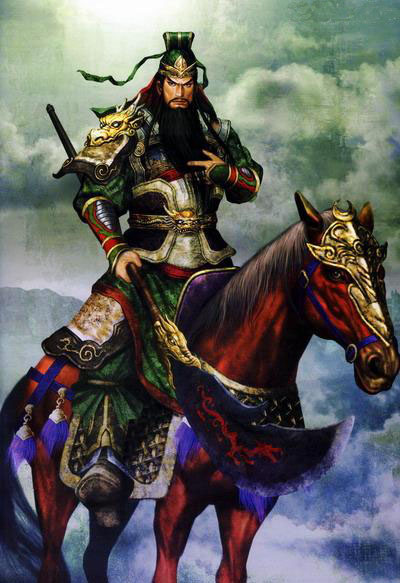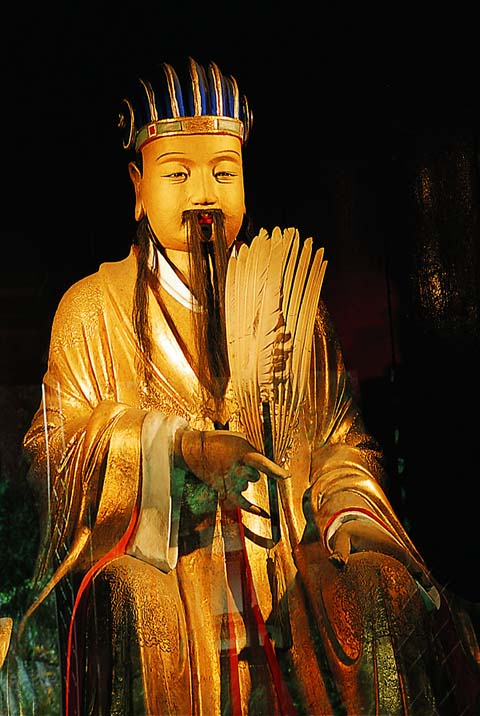
Rather than "Romance of the Three Kingdoms", the direct translation of the original Chinese name of the book "三國演義" should be "Three Kingdoms Performing Loyalty" . However, the meaning of the original Chinese character "義"; (pinyin: "yi", pronounced as "yee") is actually more than just "loyalty". "Yi" carries a comprehensive meaning of the positive human character encompassing righteousness, sense of justice, loyalty, unselfishness, generosity, being trustable, remembering favors from others etc. that a person manifests during his/her interactions with friends, the superior, the subordinate, spouse or even enemies etc. "Yi" is so important a concept in Chinese traditional culture that many Chinese classic literature works are named as "... Performing Yi", which means that the central idea told by the whole literature work is just about people's yi towards each other.
Specifically, let's talk about the yi shown in the novel "Romance of the Three Kingdoms". The three kings were warring for their whole life. Each of them were holding the ambition to unite whole China. However, all of them died before reaching the goal. The book is not to tell who is right, who is wrong or which king should be recognized in history as being better than the other two. No. The real essence that penetrates the whole novel is the righteousness manifested by all these kings, generals, and councilors' behaviors during the warring process. Political power comes and goes, but the righteous human character lasts forever.
The following are some stories on loyal behaviors in the book "Romance of The Three Kingdom".

|
| Zhao Yun - In the Chang-ban-po battle. |
Zhao Yun is a very capable martial general in Liu Bei's camp. In 208, Cao Cao started to target his army to the south. Liu Bei's army was not strong enough to resist Cao Cao's big army, so he had to leave Xin-ye. Because Liu Bei was very kind to the people, people liked to follow him. More than 100,000 people were moving together with Liu Bei's army, which made their moving very slow and Cao Cao's army was getting close. When the generals suggested Liu Bei and the army go first, Liu Bei said, "One who does big things must take people as the basis. Now people are following me. How can I leave them?"
Cao Cao's army caught up with them at Chang-ban-po. Liu Bei's army was scattered in the battle. Zhao Yun was responsible for looking after Liu Bei's wives and child. Zhao Yun lost them during the battle. Zhao Yun fought his way back and forth in the battle-field seven times to look for Liu Bei's wives and children. (Chapter 41 of the novel "Romance of the Three Kingdoms")
Zhao Yun finally found one of Liu Bei's wife and his son in a wall-surrounded yard. He suggested Liu Bei's wife to ride the horse and he would escort them to get away from the battle field. Liu Bei's wife thought it was too difficult for Zhao Yun to escort both her and the child, she left Liu Bei's son to Zhao Yun and killed herself by straightly jumping into the well in the yard.
Zhao Yun took Liu Bei's son and fought all the way out. Zhao Yun obtained the Qing-gang Sword from Cao Cao's general Xia-hou En. In the battle, Zhao Yun hacked two flags, grabbed three spears and killed over 50 generals of Cao Cao's camp.
Guan Yu was once guarding Xia-pi city and Cao Cao's army was trying to obtain the city. Guan Yu leading his solders went outside of the city walls to fight Cao Cao's army. Cao Cao's army withdrew and Guan Yu led his soldiers to run after them. When he was far away from the city, more troops of Cao Cao's camp camp up and surrounded Guan Yu's troop at a small hill. At the same time, some soldiers that falsely surrendered to Guan Yu before the battle, opened the city gate and thus Cao Cao's army occupied the city. Guan Yu's sworn brother Liu Bei's wives and child were still in the city. Liu Bei's whereabouts was unknown.

|
| Guan Yu - One of Liu Bei's sworn brothers. |
Then one of Cao Cao's generals Zhang Liao approached Guan Yu to persuade him to join Cao Cao's camp because otherwise his sworn brother's wives could not be protected. On learning this suggestion, Guan Yu set three pre-conditions that Cao Cao must guarantee before hand. 1.Guan Yu would surrender to the Han Emperor only instead of to Cao Cao. (The Han Emperor was being protected by Cao Cao at that time.) 2. Cao Cao must provide all salary and supply to Liu Bei's wives to the level that emperor's brother should deserve. Also, nobody shall approach the two ladies without invitation. 3. As soon as Guan Yu got to know Liu Bei's whereabouts, Guan Yu will leave.
Cao Cao agreed all three conditions set by Guan Yu. Then Guan Yu joined Cao Cao's camp. Cao Cao treated him extremely well. He invited Guan Yu to dinner every three days, and offered him a banquet every five days.
Cao also provided ten beautiful girls to Guan Yu as servants. Guan Yu sent them all to Liu Bei's wives and let the girls serve them instead. Guan Yu went to visit Liu Bei's wives' place every three days. Each time he saluted outside the door and asked if they were keeping well.
Cao Cao found Guan Yu's gown was already worn, he made a new gown for Guan Yu according to Guan Yu's size. Guan Yu accepted it. However, he wore the new gown inside and still wore the old gown outside. Cao Cao was curious why he was wearing like this. Guan Yu replied that the old gown was a gift given by his sworn brother Liu Bei and he would not forget about his sworn brother because of having a new gown.
On another occasion, Cao found that Guan Yu's horse was thin. Then Cao gave a horse to Guan Yu as a gift. The horse assumed a color of burning charcoal and had a grand outlook. Guan Yu could identify that it was a very famous horse that had been originally ridden by Lu Bu who was defeated by Cao Cao. Guan Yu thanked Cao Cao by kowtowing. Cao Cao asked why Guan Yu kowtowed when given a horse while not kowtowing when given girls, gold and silk? Guan Yu replied, "I know that this horse can run five hundred kilometers per day. So when I get to known my sworn brother's whereabouts, I can reach him in one day."
During the time that Guan Yu was in Cao Cao's camp, Cao Cao was fighting against Yuan Shao, which was the strongest military force after the Han Dynasty collapsed. Guan Yu killed Yan Liang and Wen Chou, who were the two strongest martial generals in Yuan Shao's camp.
After some time, Guan Yu learned of Yuan Shao's whereabouts. He then left Cao Cao without notifying him. Before leaving, Guan Yu left all the gold, silver properties given by Cao Cao in the room. He hang the official stamp in the room and did not take with him any single servant or girl given to him by Cao Cao. (Chapter 26 of the novel "Romance of the Three Kingdoms")
When Cao Cao learned that Guan Yu had left, he said to his subordinates, "Guan Yu does not forget his ex-master, and behaves very clearly both in joining us and in leaving us. This is a real man. All of you should be like him."
At this time, one councilor advised to Cao Cao, "You've been treating him so well.Yet he has left without letting you know. This is a big offence of your dignity. If he joins Yuan Shao's camp, it will be like a tiger developing wings. You should better kill him to prevent later troubles." Cao replied, "I have promised him that I would allow him to leave. How can I break my promise?"
Cao Cao told his general Zhang Liao,"Guan Yu sealed up the gold and hang up the stamp. Money could not attract him and high position could not change his will. I respect such kind of person deeply. I suppose he has not gone far. I would rather do him a favor. You go to catch up with Guan Yu and let him hold for a while so that I can see him off and gave him a gown and some fare as gifts".
Cao Cao caught up with Guan Yu and offered a plate of gold to Guan Yu as fare in his trip. Guan Yu refused. Then Cao Cao offered a gown as gift. Guan Yu accepted.
Further more, Cao Cao sent two couriers to notify the passes all along Guan Yu's way to let guards allow Guan Yu to pass through. However, Guan Yu went so fast that when he went through those passes, the guarding generals had not received Cao Cao's message yet. They all tried to block Guan Yu and were all beheaded by Guan Yu. Guan Yu went through five passes and beheaded six generals.
This classic story about Guan Yu has formed an idiom in Chinese language "Got through five passes and beheaded six generals", which means one achieves some goal after overcoming many blockades or defeating many opponents. Cao Cao allowed Guan Yu to leave despite that Guan Yu beheaded six of his generals. (Chapter 27)
Later in the critical Chibi Battle, Cao Cao was totally defeated by Wu-Shu Alliance and escaped through Hua-rong path. Zhu-ge Liang predicted that Cao Cao would went on Hua-rong path. So he dispatched Guan Yu to wait there to catch Cao Cao. Cao Cao indeed went through there and encountered troops headed by Guan Yu. At that time, Cao Cao had only 300 soldiers left and all of them was so tired that they could hardly walk. So Cao Cao himself went up to Guan Yu and asked Guan Yu to let him pass considering his past favor to Guan Yu. Guan Yu let Cao Cao get away and repaid Cao Cao's past favor. (Chapter 50)
Cao Cao likes and respects righteous and loyal persons even if the person belongs to the enemy's camp. For example, during the Chang-ban-po Battle, Cao Cao was looking at the battle field from a high place. He noticed Zhao Yun's excellent performance in the battle field. He said,"This is really a tiger general! I must obtain him." He told generals beside him, "Pass my order, no one shall shoot arrows toward Zhao Yun, I want him captured alive!"
There is anther story that manifested Cao Cao's tolerance to his subordinates. After Cao Cao won the Guandu Battle against Yuan Shao. He obtained a lot of Yuan Shao's documents, which included some letters sent to Yuan Shao from people within Cao Cao's camp. Some persons beside Cao Cao suggested to find out all those betrayers' names in those letters and kill them. Cao Cao said, "When Yuan Shao was very strong, even I could not protect myself. No mentioning others. Cao ordered to burn all those letters and did not ask about it any more.

|
| Statue of Zhu Ge Liang - Liu Bei's main councilor, famous strategist and prophet in China's history. |
After Liu Bei died, Liu Bei's son Liu Chan inherited the emperor's position of Shu Kingdom. Zhuge Liang assumed a premier's role to support Liu Chan. (Chapter 87 - 90 of book "Romance of the Three Kingdoms")
At this time, some ethnic groups to the south of Shu Kingdom started to invade in Shu regions. Zhuge Liang knew that with such ethnical groups, long peace could not be reached unless they were truly convinced and admire you, because the living environment in their regions were very unique, Han people could not live in those regions and it was not possible to dispatch officials and soldiers to govern those places even if you can defeat them.
The Southern ethnical groups collectively gathered an army of 100,000 soldiers to invade Shu regions. The head of them was Meng Huo. In each battle, Zhuge Liang not only defeated them but also captured their head Meng Huo. Each time Zhuge Liang released Meng Huo. Zhuge Liang also gave the captured southern soldiers grains, food and alcohol as gifts before letting them go back. Each time after being released, Meng Huo reorganized his army and came back to invade Shu again.This happened seven times.
At the end, Meng Huo was totally convinced and promised he would never invade the Shu regions any more.
In Chinese culture, there is an idiom "Xu Shu enters Cao Cao's camp and does not give a single advice." This saying came from the real story during the Three Kingdoms time. (Chapter 36 of the novel "Romance of the Three Kingdoms")
Xu Shu was the very first councilor that provided military stratagem advices for Liu Bei. He was a very knowledgeable person. As soon as he started to work for Liu Bei, he made plans in two battles against Cao Cao's army and got total successes in both, which shocked Cao Cao.
Cao Cao's councilor Cheng Yu knew that Liu Bei's stratagem was made by Xu Shu and that Xu Shu was very respectful to his mother. He managed to trick Xu Shu's mother into coming to Cao Cao's camp. Cao Cao asked Xu Shu's mother to write a letter and let her son come over to work for him. The mother said,
"I've heard for long that Liu Bei is the great great grandson of Xiao-jing emperor. He treats people very humbly. He has been renowned for his kindness. The world's children, elderly, vaqueros and woodsmen all know his name. He is the real hero of the current time. My son has found the right person to work for. You, although assuming the Han Premier's title, are actually the Han thief. Now you intend my son to leave the bright side for the dark side. You are shameless!"
After saying the above, the mother took the ink-stone and threw towards Cao Cao. Cao Cao was furious and ordered the knight to take her out and kill her. Cheng Yu stopped it and advised Cao Cao, "She has offended you in order to die. If you kill her, you will be regarded as being unjust. After his mother died, Xu Shu must be whole-heartedly working for Liu Bei for revenge. You should better leave her alive."
Cheng Yu then cheated Xu Shu's mother that he was the sworn brother of Xu Shu. He often sent gifts to Xu Shu's mother with a written letter. Xu Shu's mother also replied him with a written letter. In this way, Cheng Yu got to know Xu Shu's mother's hand writing style. Cheng Yu imitated her hand writing style and wrote a letter to Xu Shu assuming his mother's name. The letter said "I have been tricked into Cao Cao's camp. Only your defecting to him can save me from being killed. Please come as soon as possible..."
Xu Shu was a filial son. He told Liu Bei that he had to leave and go to Cao Cao's camp. At that time, Xu Shu was Liu Bei's very main councilor. Liu Bei was so sorrowful that he cried loud after learning it. He asked Xu Shu to stay one more night so that he could hold a farewell dinner the next day.
At this time, Sun Gan advised to Liu Bei, "Xu Shu is a wizard-like knowledgeable person. He has known all about our army. If you allow him to join Cao Cao's camp, it will be dangerous to us. You should rather keep him for some time so that when Cao Cao finds that Shu does not go over, Cao must kill Shu's mother. When Shu knows that his mother has died, he must try to seek revenge against Cao Cao. "After learning this, Liu Bei said, "I would rather die than do this kind of unkind and unrighteous things."
Xu Shu before leaving recommended Zhu-ge Liang to Liu Bei. Liu Bei paid three visits to Zhu-ge Liang's cottage to invite Liang to work for him. Zhu-ge became Liu Bei's main councilor later. In Chinese language, there is an idiom "Pay Three Visits to Cottage", which means a leader humbly inviting a capable person to work for him. The origin of the idiom was from this story of Liu Bei visiting Zhu-ge Liang.
After Xu Shu arrived at Cao Cao's camp, her mother was very surprised to see him. She seriously scolded Xu Shu for coming to Cao Cao's camp. Xu Shu felt so sorry that he kneed down on the ground and dare not look up at his mother. His mother went back into the screen after speaking these words. However, after a while someone reported that Xu Shu's mother was found hung herself to death.
From then on, Xu Shu did not accept any property awarded by Cao Cao and did not provide any advice to Cao Cao.
Go to top of page "Romance of the Three Kingdoms - II. The Central Idea: Loyalty"
Return from "Romance of the Three Kingdoms - II. The Central Idea: Loyalty" to "Foreigners in China" Home Page.